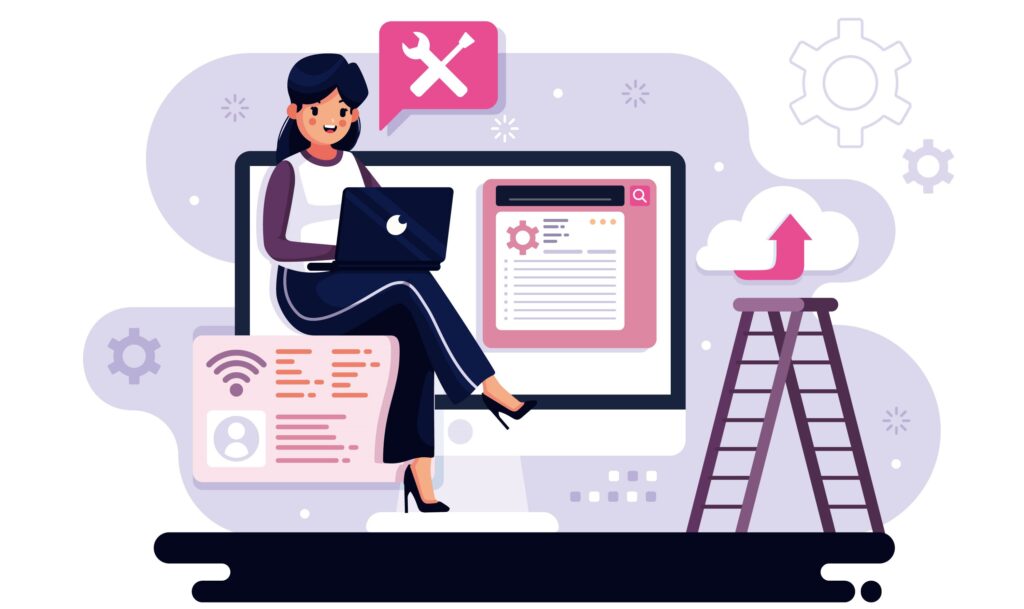A revolutionary wave is transforming the landscape—the rise of no-code platforms. The future of application development is being redefined, challenging traditional notions of coding and empowering a broader audience to actively participate in the digital revolution. In this blog post, we will explore the nuances of the “Future of No-Code” and delve into expert predictions regarding its impact on app development, especially catering to software buyers.
Historical Context: From View Source to No Code Platforms
Reflecting on the evolution of web development, we witness a paradigm shift from the simplicity of “view source” to the complexity of contemporary coding. Two decades ago, the majority of developers were immersed in coding, with the act of “viewing source” as the gateway to understanding website workings. Fast-forward to today, and the landscape has transformed, with no-code emerging as a powerful force challenging the traditional narrative.
No-Code Platforms Unveiled
But what exactly is no-code? It’s a marvel when a layperson can construct an entire application without delving into coding intricacies. No-code platforms provide a cybernetically developed environment, free from the hassles of coding. Gartner‘s prediction of an increase in app developers indicates a promising future for no-code platforms, presenting a viable solution to the increasing demand for mobile applications.
No-Code vs. Low-Code: Decoding the Confusion
The confusion surrounding no-code and low-code is commonplace. While both are hailed for their effectiveness and agility, they serve distinct purposes. Low-code platforms provide a visual environment automating coding processes, offering a holistic view of UX. On the other hand, no-code platforms take simplicity to another level, enabling non-technical users to create applications effortlessly through drag-and-drop features.
Diverse Applications of No-Code Platforms
No-code platforms bring a breath of fresh air to the software development life cycle (SDLC), introducing exclusive automation to streamline DevOps. The traditional notion that every business is unique and requires manually crafted software is challenged. No-code platforms empower users to configure and customize applications without the need for extensive coding, making the process more efficient and accessible.
No Code in Action: Real-world Software Applications
As we explore the future of no-code, it’s essential to delve into real-world applications that showcase the versatility and impact of this transformative approach to software development.
Empowering Entrepreneurs
No-code platforms have become a game-changer for entrepreneurs and small businesses. They provide a platform where individuals with innovative ideas, but limited technical expertise can bring their visions to life. Platforms like Adalo and OutSystems empower entrepreneurs to create functional prototypes, test ideas rapidly, and even launch viable products without the need for a dedicated development team.
Accelerating Prototyping and MVPs
In the fast-paced world of tech, speed to market is often a critical factor. No-code facilitates rapid prototyping and the creation of Minimum Viable Products (MVPs). This agility allows businesses to test concepts, gather user feedback, and iterate on their products swiftly. For startups and enterprises alike, this can be a game-changer in staying competitive and responsive to market demands.
The Evolution of No-Code Security
The future of no-code also brings with it an evolution in how we approach security. As applications become more accessible to non-developers, ensuring the safety of data and user information becomes paramount.
Balancing Accessibility with Security
No-code platforms inherently prioritize accessibility, but this can sometimes raise security concerns. As the user base expands beyond traditional developers, it becomes crucial to implement robust security measures. This includes encryption protocols, secure authentication processes, and compliance with industry standards. Striking the right balance between accessibility and security will be a defining factor in the widespread adoption of no-code platforms.
Integration of DevSecOps
The integration of DevSecOps into the no-code landscape is a natural progression. As security becomes an integral part of the development lifecycle, incorporating security practices early in the process is imperative. No-code platforms that seamlessly integrate security measures, automated testing, and continuous monitoring will gain prominence, assuring both developers and end-users that applications created through no-code are not just accessible but also secure.
In essence, the evolution of no-code goes beyond its developmental aspects, extending into real-world applications and demanding a proactive approach to security. As we step into this new era of software development, these additional facets enrich the narrative, offering a more comprehensive understanding of the future of no-code.
Future of App Development: Landscape of No Code
As we navigate the digital era, the question arises: Is no-code truly the future of all software development? The answer, as we will discover, is nuanced. Platforms like Webflow, Bubble, and Nocobase are already reshaping how applications are built, offering capabilities that extend beyond the confines of traditional coding.
Low-Code and No-Code Synergy
The future, it seems, lies in a harmonious blend of low-code and no-code development. Imagine crafting 80% of an application effortlessly, using intuitive drag-and-drop interfaces and visual development tools. This not only significantly reduces costs and time but also opens the door for non-developers to actively contribute to digital transformation and software creation.
No-Code: Redefining Accessibility and Affordability
The beauty of no-code lies in its ability to deliver sophisticated applications without the need for extensive coding skills. For self-service apps and automation in HR, legal, and compliance, no-code offers a cost-effective avenue. However, its limitations become apparent as projects grow in complexity, necessitating a strategic shift towards traditional custom code.
Conclusion
In conclusion, the future of no-code is a fascinating journey into a realm where accessibility, affordability, and efficiency converge. As the digital landscape continues to evolve, no-code stands as a testament to the democratization of app development. While it might not be the answer for every scenario, its role in reshaping how applications are conceived and developed is undeniable.
We invite you to share your thoughts on the future of no-code. How do you envision it impacting the software development landscape? Leave a comment below and join the conversation!






3 thoughts on “Future of No Code Platforms: Insights and Predictions from Experts”
Great read on no code platforms! Thanks for going to such depths.
So you say, “No code” platforms are something to happen in the future? No, it’s happening now, and it will continue to evolve at its own pace.
Hey, this is Ismail.
I’ve been online for more than three hours now, and I haven’t found any articles as fascinating as yours talking about the no-code concept. I think it’s worth it enough. If more bloggers and website owners created content as good as yours, the internet would be far more useful than it already is.